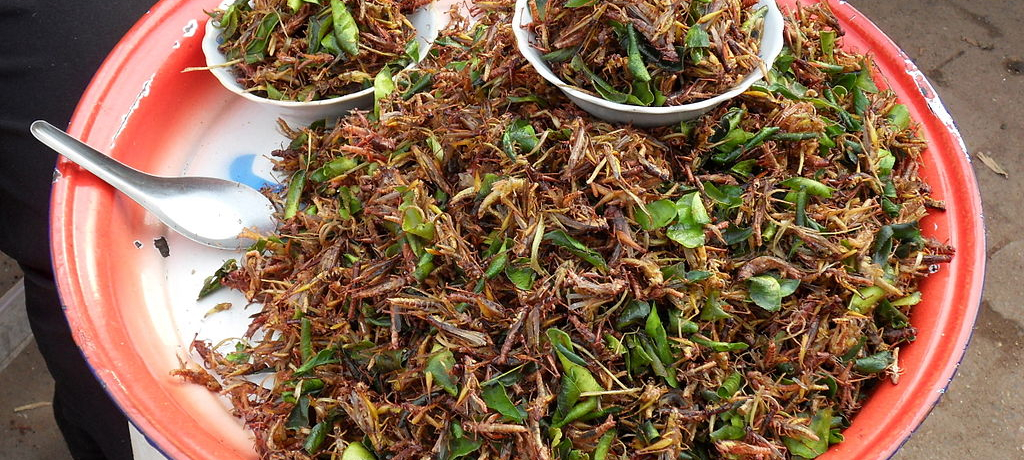The objective of this project is to enhance the human consumption experience of edible insects (entomophagy), considered as a disruptive innovation insofar as it challenges traditional benchmarks and leads to new behavioural patterns (Gallen, Pantin-Sohier and Peyrat-Guillard, 2019).
This project aims to develop the design of new insect-based products that will make it possible to change the representations of this new food through the implementation of studies and experiments based on a hybrid methodology between management sciences and design.
WINNER OF THE CALL FOR RESEARCH PROJECTS 2019
Three regional laboratories involved:
- GRANEM (University of Angers)
- LEMNA (University of Nantes)
- Food Design Lab (L’École de design)
+ the University of Delft in the Netherlands
DEIP is co-funded by the Région Pays de la Loire (West Creative Industries), the University of Angers and the École de Design Nantes Atlantique.
In the food sector, we are currently witnessing a transformation of food patterns due to population growth, depletion of natural resources, growing health concerns and changing supply (van Huis et al., 2013). This transformation is leading companies to introduce radically new food products,[1] such as insects, on the market. In the West, eating edible insects is part of a healthy and sustainable food perspective aimed at satisfying the growing demand for food while preserving the environment.
The major challenge is to familiarize consumers with insects in order to reduce taste aversions and modify mental representations to make them “culturally edible” (Corbeau and Poulain, 2002), while reducing the perceived danger and associated disgust.
[1] Algae shrimps from the New Wave company or milk-free dairy products by Willow Cup in Silicon Valley in the USA, for example.
Objectives and Methodology
The accompaniment of this protein transition implies the study of users in the acceptance of this food and culinary experience but also the conception of the experience itself. Indeed, it is necessary to be able to analyse the mental representations of consumers (Gallen, 2005) and to modify the imaginary in order to lead consumers to project themselves into these new food practices. The aim is thus to test the communication strategies that can be activated by design and marketing levers (via packaging and product design) enabling consumers to categorize insects as edible foods and promoting their dissemination.
The approach taken to this project integrates the user/consumer in an iterative way at each stage :
- EthnoSenso, an approach combining ethnology and sensory perceptions ;
- Semi-directive exploratory interviews and focus groups on representations of insect consumption and perceptions, revulsion, obstacles and motivations by varying the degree of elaboration of the insects ;
- Workshop with the presence of consumers to lead to the creation of prototypes ;
- Qualitative study of tests of the co-created prototypes. Evaluation of the sensory variables of the product design (recipes) and packaging design (colour, shape, transparency, possible picture of the insect) ;
- Quantitative validation analysis.
Calendar
Duration: 18 months, from 01/09/2019 to 01/04/2021.
Deliverables
The collaboration between the GRANEM, the LEMNA, the Food Design Lab and the Faculty of Design Engineering of Delft will result in the following deliverables (to be modulated according to the expectations of the partner companies) :
- Educational research workshops with local and international target groups and end-users,
- Testing workshops (multi- and interdisciplinary perspective with a team of researchers, designers and experts),
- Scientific publications (academic journals, a catalogue on the product or service),
- Trends and forecasts linked to design and business strategy (innovation and design thinking),
- A study day on the results for consumers and the research team.
Perspectives
This project is part of the CRI-KEE project funded by the French National Agency for Research (ANR), for which the University of Angers obtained funding in 2019. It is a phase of the ANR’s research axis 3, which is dedicated to the supply and marketing of insect-based products and edible insects in order to identify the most appropriate communication media and vectors as well as distribution methods.
A transfer of the project results to socio-economic actors is also under consideration.
Contacts
- Gaëlle Pantin-Sohier, Professor in Management Sciences at the University of Angers and researcher at the GRANEM – gaelle.pantin-sohier@univ-angers.fr
- Céline Gallen, Senior Lecturer in Management Sciences at the University of Nantes and researcher at the LEMNA – celine.gallen@univ-nantes.fr
- Dolly Daou, Director of the Food Design Lab at the École de Design Nantes Atlantique – d.daou@lecoldedesign.com


